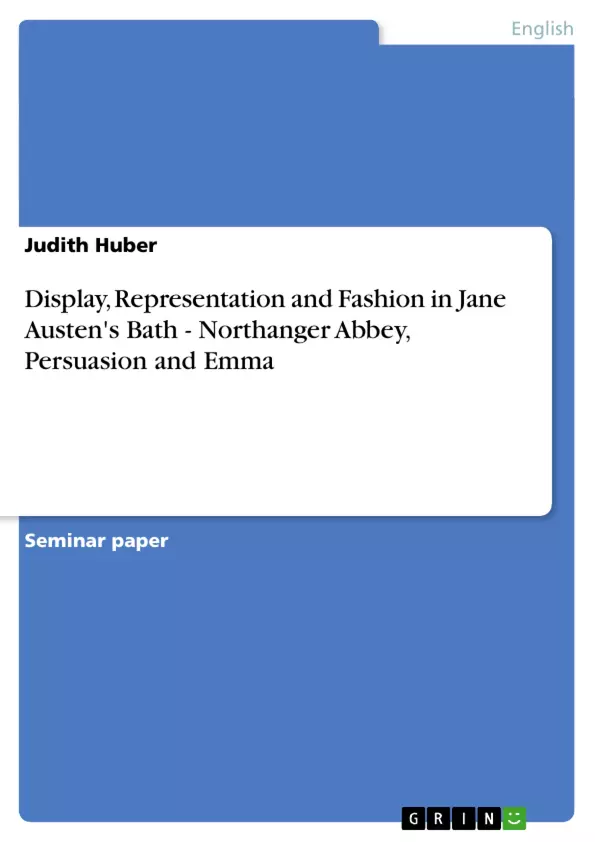The city of Bath has served as the scene of many 18 and 19 century novels, like
Daniel Defoe’s Moll Flanders, Tobias Smollet’s Roderick Random, Henry Fielding’s Tom Jones and, of course, Jane Austen’s Northanger Abbey; Persuasion and Emma. In Bath, one could find the quintessence of all the illusions, values and con- th flicts of the 18 century (Hill 1989: 2); its rules of etiquette fixed by Richard ‘Beau’ Nash influenced ‘the manners of the entire nation throughout the Georgian era’. An official Bath guide read that the city had ‘become one of the most agreeable as well as most polite places in the Kingdom’ (Watkins 1990: 178). But as the century wore on, the spa became less fashionable, the nobility became bored of it, and middle class people swamped the town. The three novels by Jane Austen mentioned above date from this time, when Bath’s heyday was over.
In my opinion, it is particularly interesting to take a look on the image of Bath as it is conveyed by these three novels, because of the different viewpoints of the characters: In Northanger Abbey, the city is described from a middle class perspective, in Persuasion from an upper class perspective, and in Emma, where none of the action actually takes place in Bath, we get an idea of what people in the country thought about the city of Bath; it is described from an extern point of view. This paper will examine the literary characterisation of the city as a place of amusement (balls, concerts, etc.), display and representation by looking at the characters’ attitudes towards Bath and the purpose of their stay there. The further aim is a cultural description of the city with regard to its fashionableness, based on the novels of Jane Austen.
Inhaltsverzeichnis (Table of Contents)
- A) Introduction
- B) Display, Representation and Fashion in Jane Austen's Bath – “Northanger Ab- bey”, “Persuasion” and “Emma”
- 1. The different characters' attitudes towards Bath
- 1.1. Emma
- 1.2. Persuasion
- 1.3. Northanger Abbey
- 2. Bath Shops in the Novels
- 3. Bath as a marriage market
- 4. A Jane Austen map of Bath - Fashionable Places
- 4.1. Public Places
- 4.2. Private Places
- 1. The different characters' attitudes towards Bath
- C) Conclusion
- D) Literature
- Appendix: Map of Bath
Zielsetzung und Themenschwerpunkte (Objectives and Key Themes)
This paper examines the literary characterisation of Bath as a place of amusement, display and representation in three novels by Jane Austen: Northanger Abbey, Persuasion, and Emma. It analyses the characters' attitudes towards Bath and their reasons for visiting the city, focusing on how these attitudes reflect the changing social dynamics of the late 18th and early 19th centuries. The paper aims to provide a cultural description of Bath, examining its fashionableness and its role as a marriage market.
- The changing image of Bath as a fashionable spa
- The different characters' attitudes towards Bath
- Bath as a place of display and representation
- Bath as a marriage market
- The relationship between fashion, class, and social mobility
Zusammenfassung der Kapitel (Chapter Summaries)
The introduction establishes Bath as a significant location in 18th and 19th century English literature, highlighting its significance as a fashionable spa and a microcosm of social values and conflicts. It also introduces the three Jane Austen novels that will be examined in the paper: Northanger Abbey, Persuasion, and Emma.
The first chapter focuses on the different characters' attitudes towards Bath. It analyzes the perspectives of Emma Woodhouse, who views Bath through the lens of Mrs. Elton's pretentiousness, and the characters in Persuasion, highlighting different perspectives on the city's social dynamics and the role of social climbing.
Schlüsselwörter (Keywords)
The main keywords and focus topics of the text are: Jane Austen, Bath, fashion, representation, display, social mobility, class, marriage market, 18th century England, 19th century England.
Frequently Asked Questions
Why was Bath significant in Jane Austen's time?
Bath was the quintessence of 18th-century social values and conflicts, serving as a fashionable spa and a central hub for social display and representation.
How does the perspective of Bath change in "Northanger Abbey" vs "Persuasion"?
In "Northanger Abbey," Bath is seen from a middle-class viewpoint, while "Persuasion" offers an upper-class perspective during the city's social decline.
What is meant by Bath as a "marriage market"?
The city provided a concentrated social environment where families could display their wealth and status to secure advantageous marriages for their children.
Does the novel "Emma" take place in Bath?
No, "Emma" describes Bath from an external point of view, showing what people living in the country thought about the city's fashionableness and pretentiousness.
Who was Richard 'Beau' Nash?
He was the Master of Ceremonies in Bath whose rules of etiquette influenced the manners of the entire British nation during the Georgian era.
- Arbeit zitieren
- Judith Huber (Autor:in), 2003, Display, Representation and Fashion in Jane Austen's Bath - Northanger Abbey, Persuasion and Emma, München, GRIN Verlag, https://www.grin.com/document/18402



